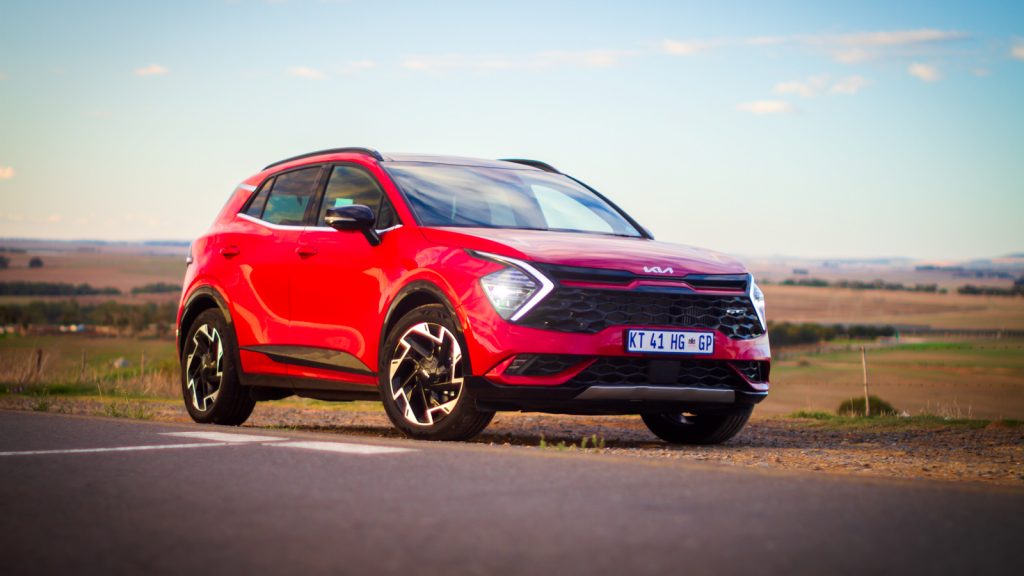Sportage 1.6 T-GDi is Kia’s boldest product offering. But is the design too daring? We experience this bold Kia, to establish an opinion.
They talk of emerging markets and rising design nodes, globally. But Korea has risen. It leads the world in consumer electronics, and its impressive car industry, once known for androgynous value vehicles, has become a reference for daring design.
No ad to show here.
You can’t risk too much with car design. Nobody wants to pay R500 000 to own something they don’t like looking at. Or want to be seen in. But if your cars are cohesively great to drive, synch with seamless UX to any digital device and possess proven quality… Well, then there are many foundational attributes supporting the risk appetite for very bold design.
Enter Kia. And specifically, its fifth-generation Sportage. Kia has purposefully been heralding the Korean car design revolution for more than a decade and a half. Under the influence of former Audi and VW designer Peter Schreyer, Kia’s delivered several daring car designs to market. And that has built impressive brand equity.
Sportage has evolved – a lot
Kias are cool Korean cars. With all the inherent engineering quality and advanced UX features you’d expect from a Korean product. But has Kia gone too far with its latest Sportage?
Kia’s mid-sized crossover is perhaps the best illustration of its evolving brand values and market equity. The BMW X3 is also in its fifth generation, but has retrospective relatability in its appearance and styling identity if you parked all the generations together. That’s not the case with Sportage.
Trace the evolution in design from first- to current-generation Sportage, and the changes are radical. There’s no lineage design elements. And that shows how bold and unconstrained Kia has been with their design mission.
Anything but boring to look at
We spent a week driving the latest Sportage 1.6 T-GDi GT-Line S. I could deconstruct the design merits, but you can judge for yourself. It’s not a shy design, which gives the Sportage credible road presence.
I think the grille and front corner light units are too geometric, but they add to the overall presence.
The tailgate is a very clever stamping, with a distinct surface curve. Not an easy engineering achievement and one which gives Sportage a distinctive rear and rear three-quarter appearance.
Sportage has great cabin UX
Korean industrial design awareness is a given with any Kia. The Sportage’s cabin architecture is much less radical than its external design, which is a good thing. That means you get a 12.3-inch curved infotainment screen with excellent device convergence.
There’s an inductive charging pad for keeping your Smartphone energised and cleverly, showing Kia’s design nous, manual dials for the HVAC controls.
Space? There’s an adequate amount in the back. The Sportage’s luggage bay measures 591-litres of volume with the rear seats in place. If you are journeying with only one other passenger, you can fold those rear seats flat. And gain 1780-litres of luggage space.
Slick and alert gearing
Despite its dramatic appearance, the Sportage 1.6 T-GDi isn’t notably powerful or fast.
The 1.6-litre turbopetrol engine boosts 132kW and 265Nm of torque. Those are reasonable engine outputs. Matched to Kia’s excellent seven-speed dual-clutch transmission, the Sportage is responsive, if a touch sensitively calibrated at low-speeds.
Ride and handling dynamics are what you would expect from a Kia. Quick steering. Firm ride. But the overall experience that blends ease of use and confidence. Kia’s premium crossover is at ease hunting for narrow parking bays in the city and travelling at speed between cities.
Not a lot of torque – for the money
With its established market confidence, Kia’s more luxurious cars now have pricing to match. And for drivers who want geater engine power and overtaking performance, rival crossovers offer more potent engine specifications for the price.
The issue is that for the Sportage’s price R762 995, you don’t get nearly the power of a Haval H6 HEV, which costs R699 950. The Chinese vehicle’s hybridised powertrain boosts 179kW and 530Nm, compared to the Sportage’s 132kW and 265Nm. And it’s that difference in torque, which is most notable when attempting to overtake slower-moving trucks, busses and taxis, in a fully laden vehicle.
You need to be confident to be this daring with design. But Kia’s been doing the product fundaments so right, for so long, that’s it has earned its latitude of expression with design. Like many things Korean, Kia is now a cool and premium brand – and it wasn’t the work of a moment.
Kia is now able to market statement cars, which would have been unthinkable in the mid-2000s. And if you are aligned with the values of Korean design – and many people are – the Sportage’s outrageous styling will be of greater value than its price-to-engine-performance ratio.
